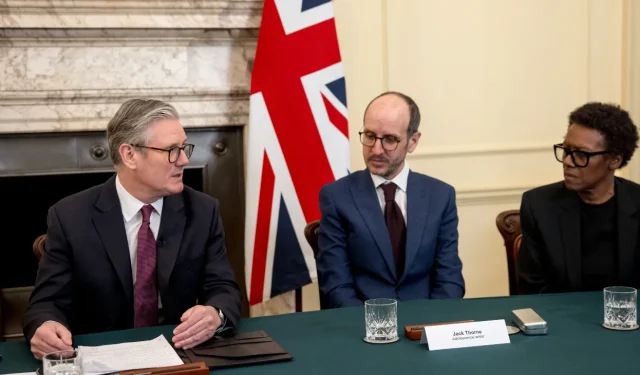Netflix’s “Adolescence”Sparks Vital Discussions on Social Media and Child Safety
The creators of the widely acclaimed Netflix series Adolescence have ignited a crucial dialogue in the UK and beyond regarding the protection of children from harmful influences, including violent misogyny prevalent on social media.
In a significant move, British Prime Minister Keir Starmer met with the show’s filmmakers at Downing Street on Monday. His office announced support for Netflix’s initiative to offer free streaming of the series to secondary schools nationwide, ensuring that a broad demographic of teenagers can engage with its critical themes.
Exploring Complex Issues Through the Lens of Drama
Set against the backdrop of a tragic event, the series follows a 13-year-old boy accused of fatally stabbing a girl at his school. It delves into the intricate ways in which social media—a realm often opaque to parents and educators—may contribute to such violent incidents.
Since its release in March, Adolescence has garnered over 66.3 million views globally, establishing itself as a focal point in discussions around youth, violence, and societal behavior in the UK.
Encouraging Dialogue and Awareness
Starmer recounted his own challenges in watching the series with his children, aged 14 and 16, noting that it resonates with the concerns many parents share. His office emphasized that broadcasting the series in schools aims to foster greater understanding among students about the consequences of misogyny, the dangers of online radicalization, and the significance of cultivating healthy relationships.
“It seems like the whole nation is talking about Adolescence and not just this nation,” Starmer stated, highlighting the widespread engagement with the show’s themes. “There isn’t one single policy lever to pull. It’s actually a much bigger problem than that.”
The Call for Broader Responsibility
Jack Thorne, co-writer of Adolescence, shared his intention to spark conversations through the series. He expressed hope that the show will not only stimulate discussion between teachers and students but also encourage peer-to-peer dialogues.
Stephen Graham, a co-creator and actor in the series, shed light on the motivations behind the narrative. He emphasized the importance of understanding that societal accountability extends beyond familial backgrounds and encompasses the entire community.
“But what if it’s not the family? We’re all maybe accountable. School. Society. Parents. Community,” Graham questioned, underscoring the collective responsibility we share.
Addressing Emerging Issues in Child Welfare
Soma Sara, the founder of the charity Everyone’s Invited, has showcased a pressing issue: the alarming trend of child-on-child sexual violence appears to “age down,”impacting children under 10. This insight reveals that attitudes bordering on misogyny may take root long before children reach adolescence.
Her organization has amassed thousands of anonymous testimonies from girls and women detailing their experiences of inappropriate behavior and abuse in school settings, with about 1,600 incidents reported from elementary schools.
“The testimonies show how early this starts, and how it’s children abusing children — that’s just the devastating reality,” Sara remarked.
The Need for Digital Literacy and Education
While some advocate for a ban on social media for younger users, as seen in Australia’s recent legislation targeting those under 16, Sara argues for a more educational approach. Her charity is leading initiatives to empower children to critically assess the misogynistic narratives and harmful content they encounter online.
“We feel the generational gap has never been wider. Parents need to be digitally literate themselves,” she emphasized, noting the significance of understanding platforms like Snapchat, YouTube, Instagram, and TikTok—where children spend substantial time scrolling.
A Crucial Moment in Addressing Societal Issues
The release of Adolescence coincides with a growing concern over the impact of smartphones and the pervasive availability of explicit content and radical ideologies on social media, often propagated by controversial figures like Andrew Tate, who faces legal charges for human trafficking and exploitation.
Gavin Stephens, the chair of the National Police Chiefs’ Council, has highlighted the evident detrimental effects of such influences, noting an alarming rise in crimes related to violence against women and girls in the UK, which constitute a significant proportion of overall crime.
“This is everyone’s problem. And this is what Adolescence says: when a child is accused, everyone’s to answer,” Sara concluded, reiterating the shared responsibility in addressing these societal challenges.


